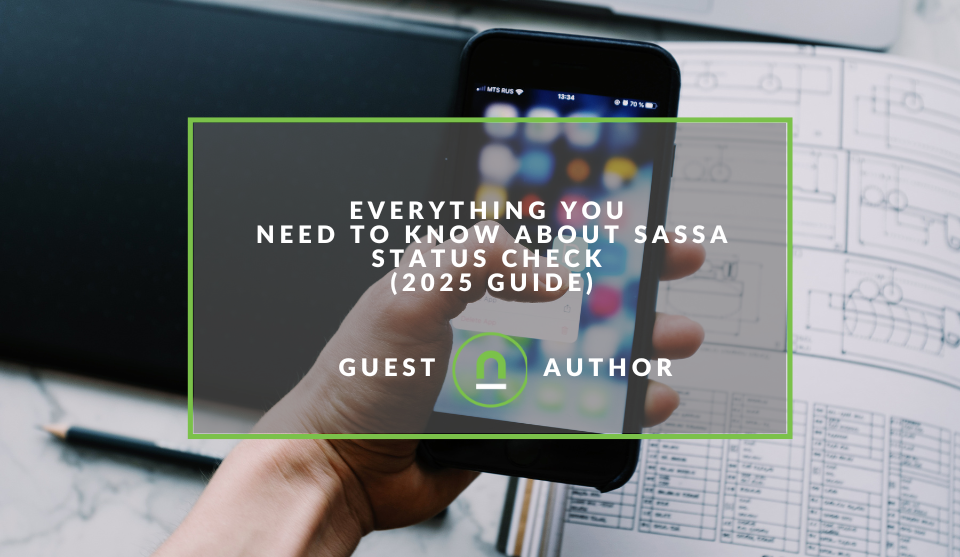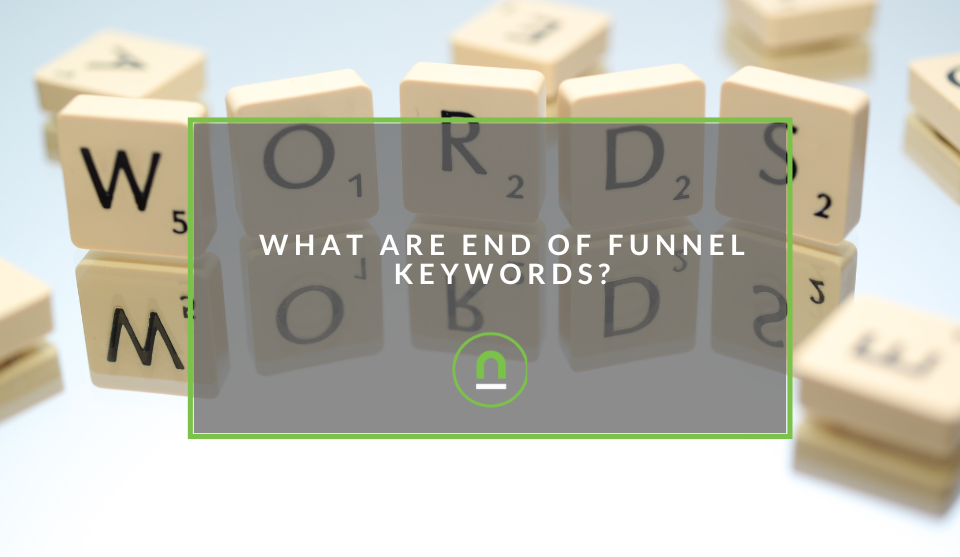Recent posts

Geek Chic
How to Replace A Broken Lenovo Laptop Screen
24 April 2025

Money Talks
Everything You Need to Know About SASSA Status Check
13 April 2025

Mind, Body & Soul
The Genetic Diversity of Cannabis Seeds
12 April 2025

Money Talks
How Small Businesses Can Leverage Blockchain Technology
02 April 2025
Popular posts
Extravaganza
Trending Music Hashtags To Get Your Posts Noticed
24 August 2018
Geek Chic
How To Fix iPhone/iPad Only Charging In Certain Positions
05 July 2020
Extravaganza
Trending Wedding Hashtags To Get Your Posts Noticed
18 September 2018
Money Talks
How To Find Coupons & Vouchers Online In South Africa
28 March 2019
What Are End of Funnel Keywords?
07 January 2025 | 0 comments | Posted by Che Kohler in nichemarket Advice
So you've got a website up and running, and you want to attract users from search engines because you've heard that's where customers tend to hang out. You wouldn't be wrong to think that Google alone serves up billions of queries per day and redirects a large portion of the world's traffic, but adding your site as an option is easier said than done.
Search engines aren't in the habit of handing out precious traffic to just any Tom, Dick and Harry with a newly purchased domain, they use a complex algorithm to rank websites, and this algorithm takes into account many factors, including the relevance and popularity of the keywords used on the website.
If a keyword is present on your website, you can technically index for it, but ranking for it is another story.
Then, even if you rank for a certain keyword, it doesn't mean you're going to get traffic; ranking number one for some ultra-niche, obscure keyword with no traffic isn't going to help you get leads.
So what you need to do is rank in the top 1-3 or 4-10, aka page one of search results, for a keyword that has a meaningful amount of daily volume that pertains to your business.
Keywords Are Not Created Equal
So what does everyone do? Dogpile is on top of optimising for the most common search terms that come to mind or some variation, like near me or a location like a city.
Again, this is not wrong, but it doesn't mean there's an endless supply of users who are smashing those search terms into their keyboards.
Some keywords are more valuable than others because they are more relevant to the content of the website or because they are more popular among users.
For example, a website about cars might use the keyword "car" to attract visitors.
However, this keyword is very broad and is used by many other websites.
As a result, it is not very valuable to the website.
A more valuable keyword would be "used car for sale," which is more specific and is more likely to be used by people who are looking for information about used cars.
In addition to relevance and popularity, search engines also consider the difficulty of ranking for a particular keyword. Some keywords are more difficult to rank for than others because they are more competitive.
For example, it is more difficult to rank for the keyword "car" than for the keyword "used car for sale."
As a result of these factors, not all keywords are created equal in the eyes of the search engines. Some keywords are more valuable than others because they are more relevant, popular, and difficult to rank for.
The Final Step in the Customer Journey
In digital marketing and SEO, understanding different types of keywords is crucial for creating an effective content strategy. Each grouping of keywords serves a different purpose: some are to inform, some are to compare, some are to educate, some are to drive conversions, and that's what we all want: conversions.
To drive direct conversions from the search, your best bet is showing up for keywords where the user has a strong intent to perform a purchase. We in the SEO biz commonly refer to them as end-of-funnel keywords or bottom-of-the-funnel keywords that play a particularly vital role in converting prospects into customers.
What Are End of Funnel Keywords?
End-of-funnel keywords, also known as bottom-of-funnel (BOFU) keywords, are search terms that indicate a user is ready to make a purchase or take a specific action.
These keywords represent the final stage of the customer journey, where visitors have already identified their problem, researched solutions, and are now ready to make a decision.
What you're essentially doing is trying to capture the customer right before they plan to pull out the credit card. Instead of merely providing education and convincing, you just want to be at the finish line waiting to capture that purchase intent.
Now, does that work? Yes and No!
If you're the only service provider or seller in your area, well, you have free reign on all those lovely end-of-funnel queries, but that's hardly ever the case; you'll have to share the impressions and clicks with your competitors.
As more competitors come into the market, search engines will try to serve up variety to keep everyone happy and give everyone a piece of the pie, but that also means diluting the pie into smaller slices.
While optimising for end-of-funnel is important, they only form one part of your keyword strategy.
Characteristics of End of Funnel Keywords
These magical keywords that lead to conversions are what everyone thinks of when they consider SEO.
It's the I want to rank for "Pajamas In Perth" energy.
So, what qualifies a keyword as the end of the funnel?
High Purchase Intent
These keywords typically demonstrate clear buying intent. Users searching with these terms are no longer in the research phase – they're ready to pull the trigger on a purchase or commitment.
Specific and Detailed
End-of-funnel keywords are usually longer and more specific than awareness or consideration-stage keywords.
They often include:
- Brand names
- Product specifications
- Purchase-related modifiers
- Location-specific terms
- Pricing information
Examples in Action
- "Buy [Product Name] online"
- "Best price for [Product]"
- "[Brand Name] vs [Competitor] pricing"
- "Purchase [Service] in [Location]"
- "[Product] discount code"
- "Sign up for [Service]"
Why End of Funnel Keywords Matter?
These keywords often have the highest conversion rates because they target users who are ready to take action. While they might have lower search volume compared to top-of-funnel keywords, they typically deliver better ROI.
Higher Competition, Higher Value
Because these keywords are so specific, they often face higher competition than broader terms. This means you might have a lower chance of ranking for them despite the fact that the traffic you get is more valuable.
This is where you need to start thinking strategically and start to break out the spreadsheets and the calculator.
Instead of being dead set on trying to rank number 1 for that one keyword that you think will make or break your business, look at the impressions it generates for your site and then apply a realistic impression share, then apply an average conversion rate and see what it's potentially worth to you.
If the cost to create content, links and more works out to be less than what you can generate from a top 3 ranking, by all means, throw the kitchen sink at it; if not, perhaps it's better that you focus on other keywords instead.
Accept the fact that you can and will be priced out of certain keywords.
How to Identify End of Funnel Keywords
So, where do I find these keywords for my brand?
Look for Action-Oriented Terms
Focus on keywords that include:
- Purchase-related words (buy, order, purchase)
- Comparison terms (vs, versus, comparison)
- Price-related terms (cost, pricing, discount)
- Action words (download, subscribe, sign up)
Analyse User Intent
Consider whether the keyword suggests someone who is:
- Ready to make a purchase
- Comparing final options
- Looking for specific product information
- Seeking pricing details
Implementing End of Funnel Keywords
Content Optimisation
When creating content around end-of-funnel keywords:
- Focus on conversion-oriented pages
- Include clear calls to action
- Provide detailed product information
- Address common purchase objections
- Include pricing and availability details
Landing Page Best Practices
Your landing pages should:
- Load quickly
- Be mobile-friendly
- Include trust signals
- Offer clear purchase paths
- Provide multiple contact options
Measuring Success
Track these metrics to gauge the effectiveness of your end-of-funnel keyword strategy:
- Conversion rates
- Revenue per visitor
- Time to purchase
- Cart abandonment rates
- Return on ad spend (ROAS)
Common Mistakes to Avoid
End-of-funnel keyword obsession is the fastest way to taint your SEO experience; I've seen this too many times; it's ugly, it's painful, and you do not want this.
Yes, you should add all the end-of-funnel keywords with reasonable volume to your site; yes, you can do some clever interlinking and off-page linking with anchor text, but learn to accept what you cannot change.
You can only extract so much juice from one keyword before you need to move on.
Don't Neglect Other Funnel Stages
While end-of-funnel keywords are valuable, they shouldn't be your only focus. A well-rounded SEO strategy includes keywords for all stages of the customer journey.
Avoid Over-Optimisation
Don't stuff your content with the same keywords over and over; you'll only see a lower return and a lot of keyword cannibalisation. Focus on creating natural, helpful content that addresses user intent while incorporating variations of keywords organically.
The Light At The End Of The Funnel
Understanding and implementing end-of-funnel keywords isn't just about improving your SEO – it's about connecting with customers when they're ready to take action, making them a crucial element of any comprehensive digital marketing strategy.
End-of-funnel keywords are powerful tools in your digital marketing arsenal, but you have to accept that they have their limits. By understanding and properly implementing these keywords, you can attract highly qualified traffic that's more likely to convert and also set reasonable expectations for yourself, your efforts and your possible ROI.
Regularly analyse and adjust your keyword strategy based on performance data to maximise results.
Contact us
If you would like us to improve the performance of your organic search or want to know more about digital marketing for your business, then don’t be shy. We’re happy to assist. Simply contact us
Are you looking to promote your business?
Business owners can create their free business listings on nichemarket. The more information you provide about your business, the easier it will be for your customers to find you online. Registering with nichemarket is easy; all you will need to do is head over to our sign-up form and follow the instructions.
If you require a more detailed guide on how to create your profile or your listing, then we highly recommend you check out the following articles.
Recommended reading
If you enjoyed this post and have a little extra time to dive deeper down the rabbit hole, why not check out the following posts on SEO and search updates.
You might also like
How to Replace A Broken Lenovo Laptop Screen
24 April 2025
Posted by Bethany Lawrance in Geek Chic
Replacing a broken Lenovo laptop screen is easier than you think! Our step-by-step guide walks you through the process. Save money and DIY!
Read moreThe Role of Customer Service in Selecting a Forex Broker
29 March 2025
Posted by Cornelia Ekong in Money Talks
Discover why excellent customer service is crucial when choosing a Forex broker, and learn how to evaluate support quality before committing your cap...
Read more{{comment.sUserName}}
{{comment.iDayLastEdit}} day ago
{{comment.iDayLastEdit}} days ago
 {{blogcategory.sCategoryName}}
{{blogcategory.sCategoryName}}

